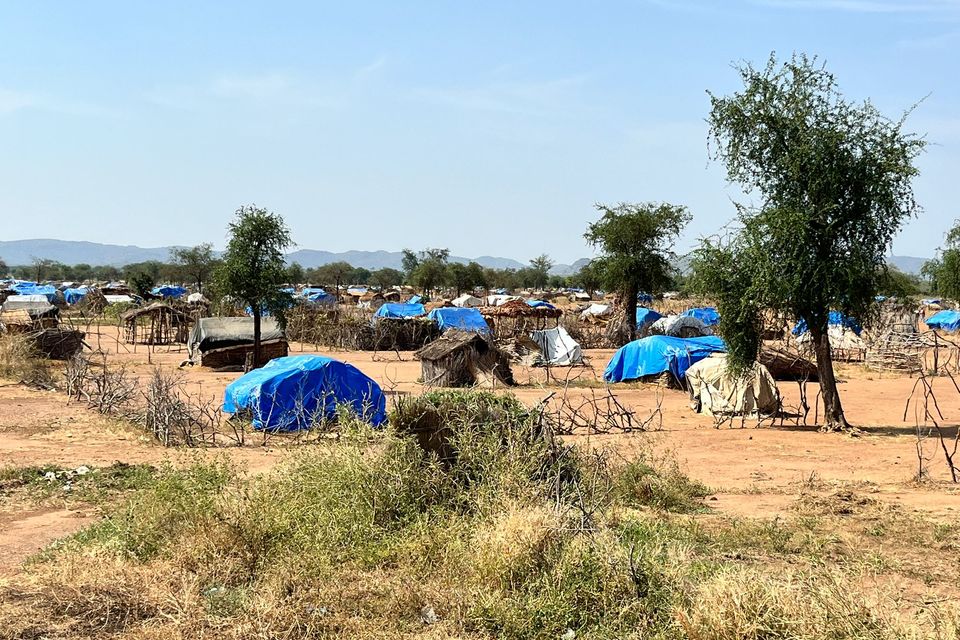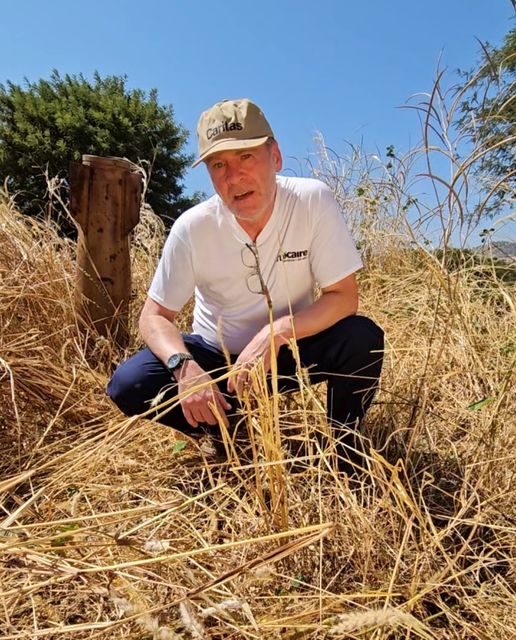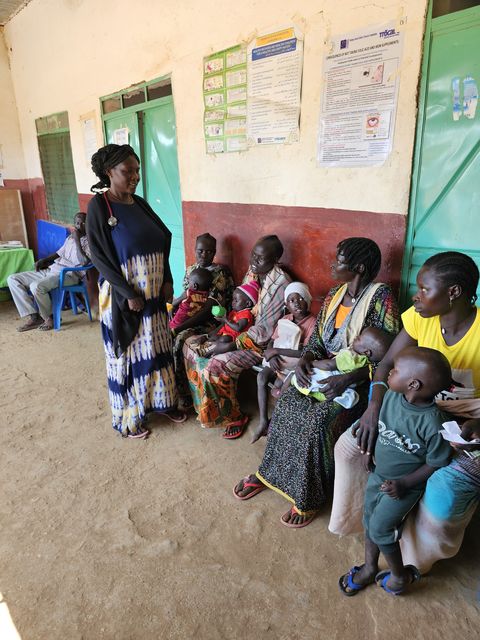
Fighting in Sudan has created what the United Nations has described as one of the largest displacement crises in history (David O’Hare/Trocaire/PA)
By Gráinne Ní Aodha,
PAToday
30/12/2024
A hunger crisis could kill more people in Sudan than bullets from its “vicious” civil war, an Irish humanitarian worker who visited the country has said.
An estimated 30 million people have been affected by malnutrition, displacement and gender-based violence that has ravaged Sudan during the conflict.
The civil war has driven an estimated 14 million people from their homes, around 30% of its population, and created what the United Nations has described as one of the largest displacement crises in history.
David O’Hare, from Irish charity Trocaire, said the scale of the need in the north African nation is the worst he has ever seen and is going “totally under the radar, unfortunately”.

David O’Hare, of Irish charity Trocaire, in Sudan, where he said a hunger crisis could kill more people than bullets from the civil war (David O’Hare/Trocaire/PA)
On a recent trip, he visited an internal displaced persons (IDP) camp in Thobo and was struck by one mother in particular, Madina.
After losing her husband and son, she and her seven children walked for six days to the camp in mid-30C heat, eating leaves and grass for food.
Her youngest boy, Murimabi, was extremely malnourished and was treated at a health centre which she said saved his life.
“I would have guessed he was three – he was nine,” Mr O’Hare, who is based in Belfast, told the PA news agency.
“Severe malnutrition over a prolonged period of time had stunted his growth. The Trocaire staff told me that his health has vastly improved since he arrived, but he still obviously has many medical issues stemming from that malnutrition.”
Sudan was plunged into conflict in mid-April 2023, when long-simmering tensions between its military and paramilitary leaders broke out in the capital of Khartoum and spread to Darfur and other regions.
I've worked in the humanitarian sector for nearly 20 years, and I'm still finding it hard to get my head around the scale of the crisis that I saw first-hand in SudanDavid O'Hare, Trocaire
This has badly affected a nation heavily reliant on agriculture, where people are forced to leave their land and can no longer grow their own food.
Climate change has also led to poor harvests, due to either a lack of rain or land being flooded.
Famine has been declared in five areas across the country, with a further five areas due to enter famine conditions in the coming months.
“Around 14 million people, 30% of the inhabitants of Sudan, have been forced to flee their homes,” Mr O’Hare said.
“So, to put that in context, that’s twice the population of the entire island of Ireland.
“I’ve worked in the humanitarian sector for nearly 20 years, and I’m still finding it hard to get my head around the scale of the crisis that I saw first-hand in Sudan.
“There’s roughly 48 to 50 million inhabitants, so half the population – 25 million people – are at risk of acute malnutrition. It’s absolutely horrendous.”

David Trocaire said he thought a nine-year-old boy called Murimabi whom he met in a camp in Sudan was around three years old (David O’Hare/Trocaire/PA)
Trocaire runs 15 rural health centres and 11 nutrition outreach sites in the country to help tackle hunger and health issues.
The Amdulu Health Centre was originally set up to help 12,000 people, but that number has doubled since an IDP camp opened nearby.
Mr O’Hare said head of clinic Elizabeth Philip Kori described malnutrition as “a major problem”, particularly for women and children.
In the state where the Nuba Mountains are located, South Kordofan, a million displaced people have arrived and added to its population of two million people in an already poor area.
The scale of the need is totally outstripping available resources, which is one of the reasons why our Christmas appeal is for children in conflict, including kids in SudanDavid O'Hare, Trocaire
Juma Idris Kuku, the regional director of the Sudan Relief and Rehabilitation Association, told Mr O’Hare that in this region it is not the fighting that kills people, it is a lack of food.
“The conflict has been the driver, but that’s not what is the biggest risk to people at the moment,” he said.
Asked what it is about the crisis that makes it the worst he has seen, Mr O’Hare said: “It’s the scale that is just so vast.
“It’s when I see kids that are very obviously malnourished, they’ve got the little swollen bellies, their heads are very big. You can see obvious stunting in their growth.
“On a human level, that’s what gets me the most. It’s women and children who always seem to be the most vulnerable in these situations.”
He added: “The scale of the need is totally outstripping available resources, which is one of the reasons why our Christmas appeal is for children in conflict, including kids in Sudan.”

Mothers and children wait at a clinic in Sudan (David O’Hare/Trocaire/PA)
But he said the actions of a group of farmers in the Nuba mountains, who shared food with new arrivals to the region, had given him hope.
“They didn’t have a safety net for themselves in terms of food, and yet they still … shared what little they had with those people who were even worse off than them, who’d had to flee with nothing,” he said.
“That mutual support for someone, a stranger, but that you know they’re in a worse position than you are, and those farmers did share what little they had. That gives me hope.”
No comments:
Post a Comment